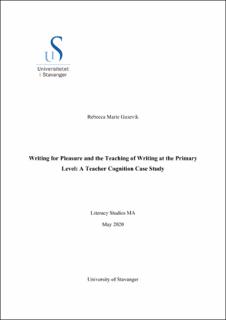| dc.description.abstract | This research project is a collective case study exploring teacher cognition in relation to the teaching of first language (L1) writing at the primary level in England. The study places particular emphasis on writing for pleasure, which may be defined as writing undertaken for the sake of enjoyment and/or satisfaction. This concept has been less considered than its reading counterpart, especially in classroom contexts, but has recently begun to gain more prominence within this field. The current study contributes to this expanding discourse through a lens of teacher beliefs, a sub-concept to teacher cognition. In exploring this topic, the study employs a qualitative research method, combining traditional (semi-structured interviews) and more experimental methods of data collection (participant-produced drawings).
The findings show that writing for pleasure plays some role in the teachers’ reported beliefs about the role of writing for pleasure in teaching writing. This is because the teacher informants, as a whole, placed more emphasis on some aspects of writing for pleasure than others. Particularly, the teachers highlighted practices which they believed would foster volition and a sense of control within their pupils throughout the writing process. Writing for pleasure appeared to play a more limited role in their reported beliefs about teaching literacy than did reading for pleasure. Four factors are suggested to be main influences regarding such reported beliefs about the role of writing for pleasure in their teaching: the influence of their own experiences as learners; their learners’ positive or negative attitudes toward writing for pleasure; the collective beliefs of the environment in which the teachers worked; and what is attributed significance at a governmental level. In regard to the latter point, half of the teachers also expressed beliefs that the National Curriculum prevented them from fully teaching in accordance with their beliefs. Furthermore, the teachers’ reported beliefs about teaching writing are reflected in their visual self-representation to a significant extent, because features which were described as important in the interviews were portrayed in their drawings or discussed in relation to them. Lastly, the teachers’ reported beliefs reflect, to a significant extent, the main theories considered for this study, including learning motivation theories, sociocultural theory, and theories relating to writing, writing for pleasure, teacher cognition and visual research. | en_US |
